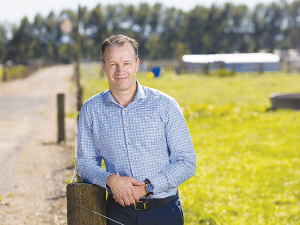DairyNZ chair wants cross-party deal
New DairyNZ chair Tracy Brown says bipartisan agreement among political parties on emissions pricing and freshwater regulations would greatly help farmers.
 DairyNZ chief executive Tim Mackle says emissions pricing is one of the most important issues Kiwi farmers will face in a generation.
DairyNZ chief executive Tim Mackle says emissions pricing is one of the most important issues Kiwi farmers will face in a generation.
DairyNZ is advocating for farmers to get a fair deal when agricultural emissions are priced by 2025, says chief executive Tim Mackle.
He points out that emissions pricing is one of the most important issues Kiwi farmers will face in a generation.
DairyNZ is a partner of the Primary Sector Climate Action Partnership, He Waka Eke Noa (HWEN) and is currently consulting farmers. An extra 15 regional online meetings have been added this month.
Mackle says this consultation is important for the sector – playing a part in how emissions are priced, and ensuring dairy maintains a degree of control, is vital.
“Two options put up by HWEN are backed by science and we want farmers to understand the pros and cons, and input into the outcome,” Mackle told Dairy News.
The Government has legislated to put agriculture into the NZ Emissions Trading Scheme [ETS] if the sector doesn’t come up with a better option.
“This is our chance to influence – because, frankly, the ETS as it stands now would be the worst outcome for farmers and New Zealand,” says Mackle.
The ETS would be a broad-based tax increasing every year and wouldn’t recognise or reward on-farm actions to reduce emissions. HWEN options will invest in on-farm actions and R&D.
“The HWEN options are one part of the puzzle. Emissions targets, climate metrics and the science of warming also play a part in ensuring agriculture emissions are being treated fairly. DairyNZ will continue advocating strongly on farmers’ behalf for the best outcomes.”
Emissions targets sit outside HWEN but the Government’s emissions target review in 2024 gives opportunity to advocate for targets that are science-based, work for farmers and enable dairy to remain internationally competitive.
Mackle says the options developed by HWEN recognise the split gas approach – unique levy prices will be used for short-lived and long-lived gases. The ETS doesn’t recognise split gas – another reason to keep ag out of the ETS.
In 2019, the sector won a hard-fought science-based agreement to have a split gas approach in the Zero Carbon Act. This recognises biogenic methane (from animals and plants) only needs to reduce and stabilise, not go to net-zero like long-lived gases.
What Will The Options Cost?
Tim Mackle says the HWEN options do cost to run, an leaders have acknowledged that.
"We are working hard to manage this aspect and reduce unnecessary operating costs. Unfortunately, the ETS would be much more expensive for farmers," he says.
Under the ETS, the cost would be at least $600m by 2030, says Mackle. "On-farm sequestration wouldn't be recognised unless it met the ETS criteria. This requires specific plantings of a certain shape and size, and the money would go into the Government's consolidated account, instead of supporting farmers."
Under the HWEN farm level levy option, the cost to farmers will be less than the ETS. In this option, sequestration and emissions reductions by farmers are calculated and reduce the cost.
Mackle says under the processor level levy option, between $137 and $590 million could be raised (through collection). Up to $520 million of that will go back to farmers.
"This option acknowledges uptake of new technology and sequestration, and R&D investment in options to further reduce emissions."
Carbon Credits
Getting greater recognition for the sequestration happening on farms was a major priority for DairyNZ in HWEN.
Farmers will get recognition for farm more types of vegetation under the ETS, including pre-1990 natives, shelterbelts and riparian strips.
The 2008 baseline was chosen for a number of reasons, but mainly to make the process of getting recognition as simple and straight-forward for farmers as possible. Earlier baselines are very difficult to verify, due to limited or poor-quality satellite imagery.
"Under the ETS people have really struggled to be able to provide enough information to get their native trees into the ETS.
"That said, it's a theme that has popped up through consultation, so we'll be looking at this closer with our partners," says Mackle.
The 5+ A Day Charitable Trust has launched a collection of affordable recipes designed to turn everyday vegetables into seasonal stars.
Jane Mellsopp has been confirmed as the new Government Appointee to the New Zealand Meat Board (NZMB).
To celebrate the tenth anniversary of its annual Good Deeds competition, Rabobank will give away $100,000 to improve rural community hubs, schools, clubrooms, and marae across New Zealand.
Agricultural and veterinary product supplier Shoof International has appointed Michaela Dumper as its new chief executive.
Federated Farmers is celebrating following the Government's announcement that young farmers will be able to use their KiwiSaver funds to buy their first home or farm.
The Meat Industry Association of New Zealand (MIA) today announced that Chief Executive Officer Sirma Karapeeva has resigned from the role.
OPINION: Staying with politics, with less than nine months to go before the general elections, there’s confusion in the Labour…
OPINION: Winston Peters' tirade against the free trade deal stitched with India may not be all political posturing by the…